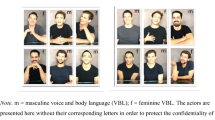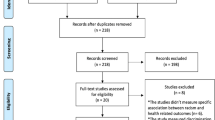Abstract
In this paper Bloom analyzes the popular magazine, Men's Health, from a feminist perspective, locating ways that the magazine participates in an insidious form of anti-feminist backlash. She specifically analyzes the magazine to make sense of how its writers discursively position women in their relationships to heterosexual men and how they use the voices of women who call themselves feminists to promote an anti-feminist, pro-patriarchy agenda. She demonstrates that the “health” of men being promoted in this magazine is a mental health grounded in the maintenance of male privilege and power.
Similar content being viewed by others
REFERENCES
Boyles, D. (September 1994). Sick sense. Men's Health, 9(7), 48–49.
Byron, C. (September 1994). Work ethics. Men's Health, 9(7), 87–91.
Donaton, S. (March 6, 1995). Editor of the Year. In Advertising Age, S16–S17.
Faludi, S. (1995). “I'm not a feminist but I play one on TV.” MS (March/April), 31–39.
Goldman, E. (December 1994). Dangerous curves. Men's Health, 9(10), 56–59.
Giroux, H. A. and Simon, R. I. (1989). Popular culture as a pedagogy of pleasure and meaning. In H. Giroux and R. I. Simon (Eds.), Popular culture schooling, & everyday life. (pp. 1–29). New York: Bergin and Garvey.
hooks, b. (1994). Outlaw culture: Resisting representations. New York: Routledge.
Kellner, D. (1995). Media culture: Cultural studies, identity and politics between the modern and the postmodern. London: Routledge.
Pittman, F. (1993). Man enough: Fathers, sons, and the search for masculinity. New York: G. P. Putnam's Sons.
Roman, L. and Christian-Smith, L. (1988). Becoming feminine: The politics of popular culture. London: The Falmer Press.
Rush, F. (1990). The many faces of backlash. In D. Leidholdt and J. Raymond (Eds.), The sexual liberals and the attack on feminism (pp. 165–174). New York: Pergamon.
Tuchman, G. (1978). Introduction: The symbolic annihilation of women by the mass media. In G. Tuchman, A. Daniels, and J. Benet (Eds.), Hearth and home: Images of women in the mass media (pp. 3–38). New York: Oxford University Press.
Wallace, M. (1990). Invisibility blues: From pop to theory. London: Verso.
Walters, S. D. (1995). Material girls: Making sense of feminist cultural theory. Berkeley: University of California Press.
Zinczenko, D. (October 1994). Wise up! Men's Health, 9(8), 97–112.
Author information
Authors and Affiliations
Rights and permissions
About this article
Cite this article
Bloom, L.R. A Feminist Reading of Men's Health: Or, When Paglia Speaks, the Media Listens. Journal of Medical Humanities 18, 59–73 (1997). https://doi.org/10.1023/A:1025610726434
Issue Date:
DOI: https://doi.org/10.1023/A:1025610726434




